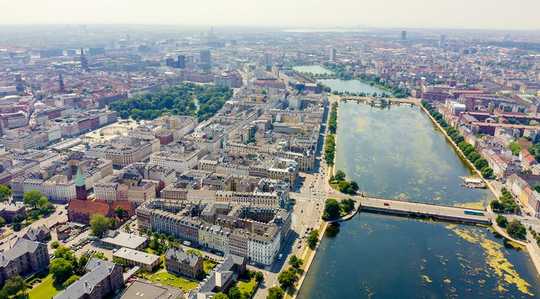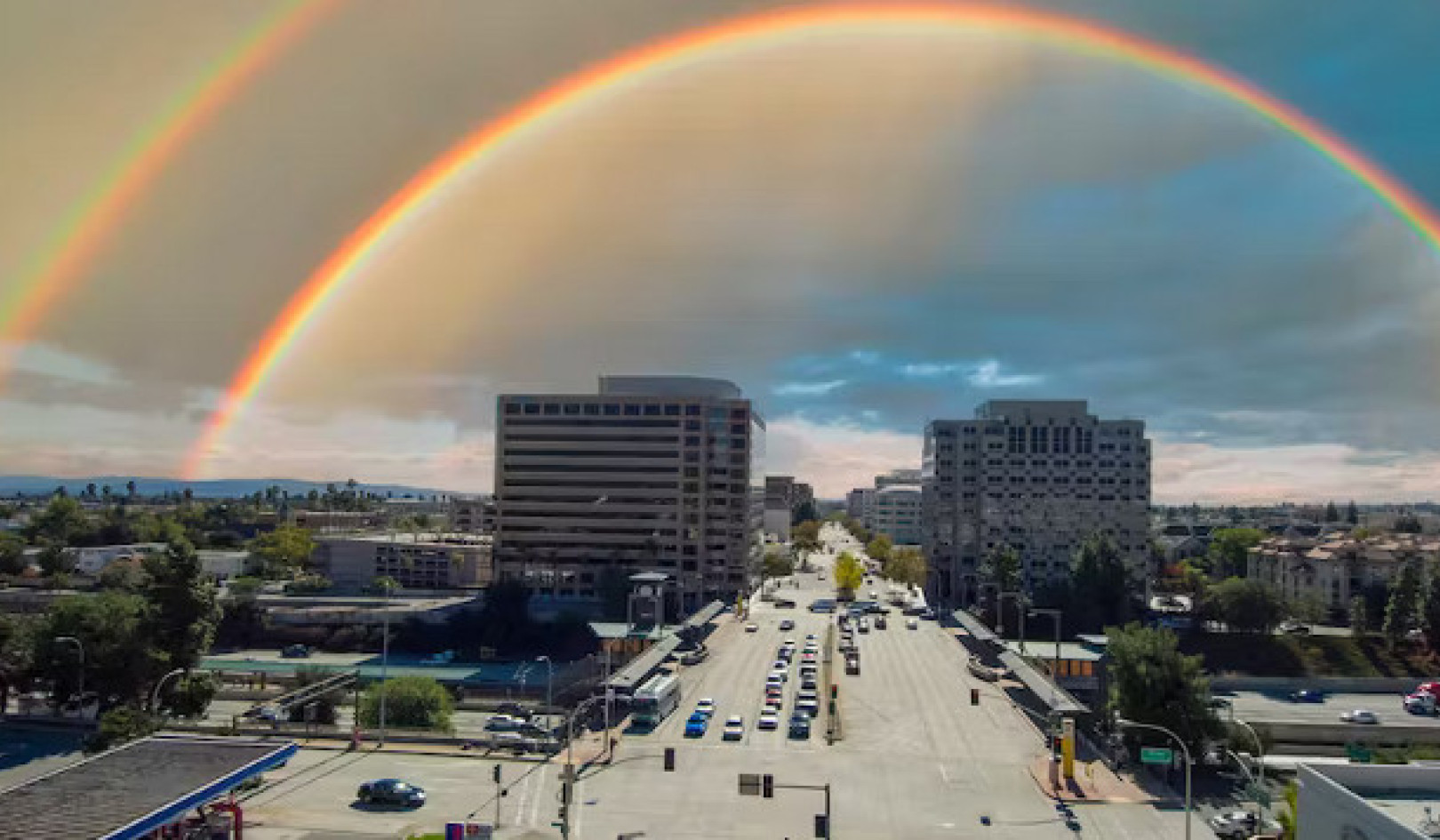
Copenhagen hosts the C40. Maykova Galina/Shutterstock.
At the seventh World Mayor’s Summit in Copenhagen, leaders of 94 cities embraced a global Green New Deal, in an attempt to make the 2020s the defining decade in the fight against climate change. The major new initiative commits to limiting global warming to 1.5°C above pre-industrial levels, halving emissions by 2030.
Cities matter enormously for the battle against climate change, because while they are a major source of the problem, they also offer the resources to tackle it. Most people live in cities, and they are expected to house almost 70% of the global population by 2050. Already, 75% of global energy demand, and 80% of greenhouse gas emissions come from hungry urban hubs. So any solution to the climate emergency must include a vision of a global network of low carbon, sustainable cities.
The C40 Cities – which convenes the World Mayor’s Summit each year – is a transnational municipal network that coordinates the efforts of member cities to protect the environment. Inhabitants of the C40 cities make up a twelfth of the world’s population, and their economic power represents a quarter of the global economy. So the Global Green New Deal augments the C40’s work since 2005 with a central ideological vision, to shape their agenda in the coming decades.
Driving climate action
This coordinated action by the C40 mayors is an attempt to drive forward a practical green agenda, as the actions of state governments continue to fall short of what’s needed to address the climate crisis. The move comes on the back of yet another disappointing failure of states to agree effective measures to meet the global warming targets set out by the Paris Agreement, at the UN Climate Action Summit in September 2019.
A range of other actors, including business and civil society, as well as youth climate activists, have also endorsed the global Green New Deal. The significant emphasis upon youth at the Copenhagen summit – including the announcement of a new C40 Global Youth Initiative - suggests an intriguing link between the hopes of a new generation and the leadership and political potential of cities.
Please listen to the words of @NakabuyeHildaF , a founder of Fridays For Future in Uganda. https://t.co/EifY1jsANR
— Greta Thunberg (@GretaThunberg) October 13, 2019
In my recent book, Global Cities and Global Order, I describe how cities are making use of new channels offered by transnational networks to act collaboratively where states have failed. Through these mechanisms they have the ability to take the Green New Deal global in ways that states do not. The C40 has helped to drive cities towards such a future in the last decade: figures released to coincide with the Copenhagen summit suggest that 30 cities, including London, New York, Athens, Venice and Lisbon, have now peaked their emissions and are making progress towards a net-zero target.
But what is particularly notable about the C40’s decision to embrace the Green New Deal agenda – with its ambitions to eradicate greenhouse gas emissions from electricity, transportation, manufacturing and agriculture within the next decade - is that it offers a different political vision to the predominantly market-based neoliberal model of the past.
Conflicting agendas
As its name implies, the Green New Deal draws inspiration from the New Deal programs of president Franklin Roosevelt in the post-depression United States of the 1930s, which were driven by heavy state investment and intervention in the economy. Many progressive politicians, such as rising democratic star Alexandria Ocasio-Cortez, who gave a keynote address at the C40 Summit, are championing these ideas as a way forward.
Embracing the Green New Deal may put cities at odds with the states they are located within, which show little sign of committing to such an approach. Indeed, in the United States, the Green New Deal has been vehemently opposed by Republicans and some Democrats.
This highlights a weakness of cities, which are particularly dependent on state policies when it comes to their own budgets. At present it is unclear whether the political will exists for states to support the 21st century Green New Deal. So it’s unclear how C40 cities will finance the commitments that come with this new agenda.
A practical approach
The timescale for effective action on climate change is short, and practical steps urgently needed. But mayors are practical people. They are able to act on the ground, and to implement successful policies more quickly than slow moving and prevaricating states. If cities find that a particular policy or measure works in one place, the global networks that cities have formed offer the opportunity for success to spread quickly around the world.
In that coming decade, the role of mayors – and the capabilities offered by transnational urban networks such as the C40 – will play an increasingly prominent role in bridging the local, national and global scales to act decisively on climate change.
Mayors can’t save the planet by themselves. But they do have unique abilities to convene different actors, to shape private sector investment, to coalesce civil society around specific agendas, to influence the work of international organisations such as the UN, to interact with local populations, to act quickly on the ground and to unite collectively in globe-spanning networks. As states continue to fail on climate change, the leadership shown by mayors of global cities offers a spark of hope.![]()
About The Author
Simon Curtis, Senior Lecturer in International Politics, University of East Anglia
This article is republished from The Conversation under a Creative Commons license. Read the original article.
Related Books
Climate Leviathan: A Political Theory of Our Planetary Future
by Joel Wainwright and Geoff Mann How climate change will affect our political theory—for better and worse. Despite the science and the summits, leading capitalist states have not achieved anything close to an adequate level of carbon mitigation. There is now simply no way to prevent the planet breaching the threshold of two degrees Celsius set by the Intergovernmental Panel on Climate Change. What are the likely political and economic outcomes of this? Where is the overheating world heading? Available On Amazon
How climate change will affect our political theory—for better and worse. Despite the science and the summits, leading capitalist states have not achieved anything close to an adequate level of carbon mitigation. There is now simply no way to prevent the planet breaching the threshold of two degrees Celsius set by the Intergovernmental Panel on Climate Change. What are the likely political and economic outcomes of this? Where is the overheating world heading? Available On Amazon
Upheaval: Turning Points for Nations in Crisis
by Jared Diamond Adding a psychological dimension to the in-depth history, geography, biology, and anthropology that mark all of Diamond's books, Upheaval reveals factors influencing how both whole nations and individual people can respond to big challenges. The result is a book epic in scope, but also his most personal book yet. Available On Amazon
Adding a psychological dimension to the in-depth history, geography, biology, and anthropology that mark all of Diamond's books, Upheaval reveals factors influencing how both whole nations and individual people can respond to big challenges. The result is a book epic in scope, but also his most personal book yet. Available On Amazon
Global Commons, Domestic Decisions: The Comparative Politics of Climate Change
by Kathryn Harrison et al Comparative case studies and analyses of the influence of domestic politics on countries' climate change policies and Kyoto ratification decisions. Climate change represents a “tragedy of the commons” on a global scale, requiring the cooperation of nations that do not necessarily put the Earth's well-being above their own national interests. And yet international efforts to address global warming have met with some success; the Kyoto Protocol, in which industrialized countries committed to reducing their collective emissions, took effect in 2005 (although without the participation of the United States). Available On Amazon
Comparative case studies and analyses of the influence of domestic politics on countries' climate change policies and Kyoto ratification decisions. Climate change represents a “tragedy of the commons” on a global scale, requiring the cooperation of nations that do not necessarily put the Earth's well-being above their own national interests. And yet international efforts to address global warming have met with some success; the Kyoto Protocol, in which industrialized countries committed to reducing their collective emissions, took effect in 2005 (although without the participation of the United States). Available On Amazon
From The Publisher:
Purchases on Amazon go to defray the cost of bringing you InnerSelf.comelf.com, MightyNatural.com, and ClimateImpactNews.com at no cost and without advertisers that track your browsing habits. Even if you click on a link but don't buy these selected products, anything else you buy in that same visit on Amazon pays us a small commission. There is no additional cost to you, so please contribute to the effort. You can also use this link to use to Amazon at any time so you can help support our efforts.






















